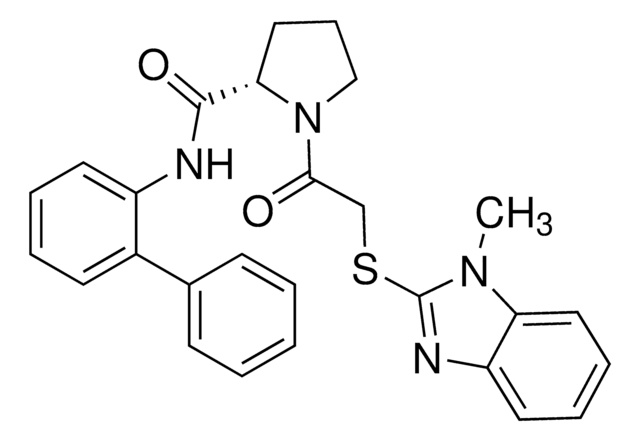S2694
SB-408124
≥98% (HPLC), solid
Synonym(s):
N-(6,8-Difluoro-2-methyl-4-quinolinyl)-N′-[4-(dimethylamino)phenyl]urea
About This Item
Recommended Products
Quality Level
Assay
≥98% (HPLC)
form
solid
color
off-white
solubility
DMSO: >10 mg/mL
originator
GlaxoSmithKline
storage temp.
2-8°C
SMILES string
CN(C)c1ccc(NC(=O)Nc2cc(C)nc3c(F)cc(F)cc23)cc1
InChI
1S/C19H18F2N4O/c1-11-8-17(15-9-12(20)10-16(21)18(15)22-11)24-19(26)23-13-4-6-14(7-5-13)25(2)3/h4-10H,1-3H3,(H2,22,23,24,26)
InChI key
JTARFZSNUAGHRB-UHFFFAOYSA-N
Application
Biochem/physiol Actions
Features and Benefits
Legal Information
Signal Word
Warning
Hazard Statements
Precautionary Statements
Hazard Classifications
Eye Irrit. 2 - Skin Irrit. 2 - STOT SE 3
Target Organs
Respiratory system
Storage Class Code
11 - Combustible Solids
WGK
WGK 3
Flash Point(F)
Not applicable
Flash Point(C)
Not applicable
Personal Protective Equipment
Certificates of Analysis (COA)
Search for Certificates of Analysis (COA) by entering the products Lot/Batch Number. Lot and Batch Numbers can be found on a product’s label following the words ‘Lot’ or ‘Batch’.
Already Own This Product?
Find documentation for the products that you have recently purchased in the Document Library.
Customers Also Viewed
Our team of scientists has experience in all areas of research including Life Science, Material Science, Chemical Synthesis, Chromatography, Analytical and many others.
Contact Technical Service










